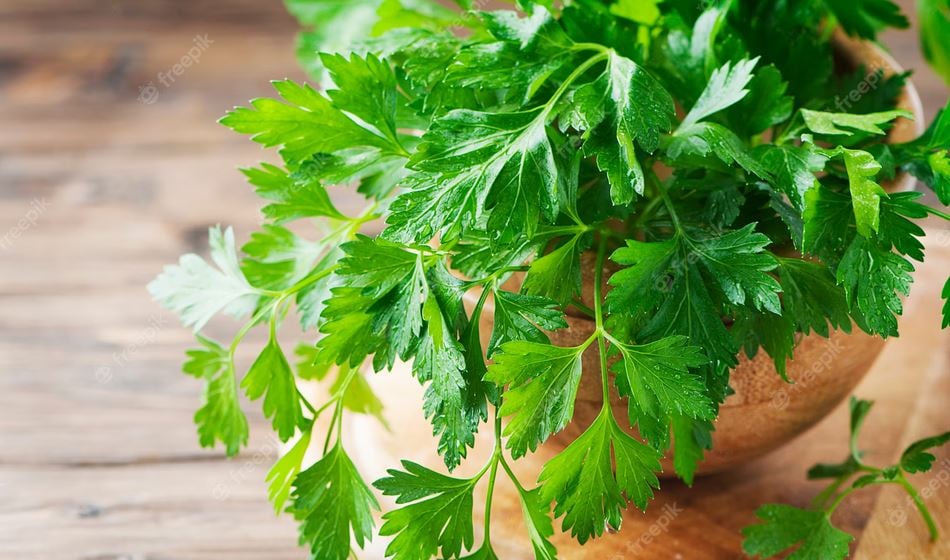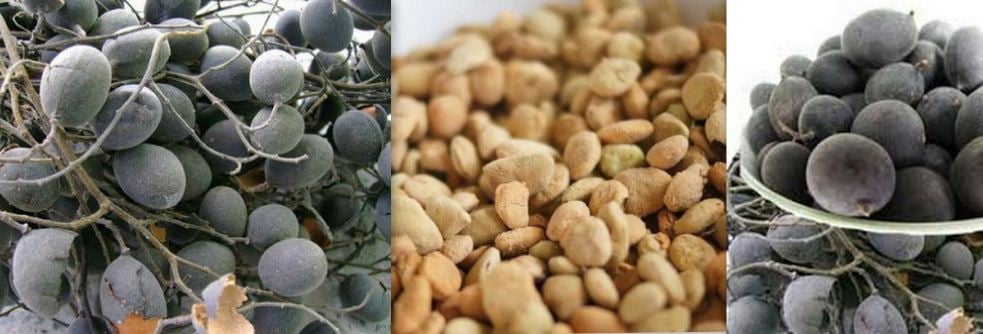Health Benefits of Curry Leaves

Curry leaves serve a dual purpose of enhancing dishes' flavor and medicinal purposes in India, Nigeria, and Southeast Asia. The names sweet neem or kadi patta are also applicable to them.
These small green leaves have a unique flavor and aroma, making them a popular seasoning in South Indian dishes such as sambhar, rasam, and chutney.
23 Amazing Health Benefits of Curry Leaves
Curry leaves contain essential nutrients and potent plant compounds, offering many health benefits. This article will explore 23 fantastic health benefits of curry leaves.
Nutritional Value of Curry Leaves
Curry leaves are a rich source of essential nutrients and minerals. A serving size of 100 grams of curry leaves equals 108 energy calories. These foods are rich in nutrients such as carbs, protein, fiber, calcium, phosphorus, iron, and other crucial minerals. Moreover, they contain vitamins such as A, B, C, and E.
1. Powerful Antioxidant
Curry leaves are rich in plant compounds that act as powerful antioxidants. Antioxidants neutralize and counteract the oxidative damage caused by free radicals within the body. Antioxidants also work to protect cell membranes from the cell-damaging effects of oxidation.
Harmful substances can cause damage to our bodies, but these chemicals shield us from such harm. They end the issues about our nervous, heart, and kidney functions.
1.1 Protection from Oxidative Damage
Curry leaves have one of the highest antioxidant levels in the world. The research study confirms that curry leaves can shield our cells against the detrimental impact of free radicals. This protection is crucial for preventing various diseases and maintaining overall health.
1.2 Prevention of Diseases
Our cells are vulnerable to harm and diseases like cancer due to free radicals in our bodies. Your health can significantly benefit from the intake of curry leaves. Berries contain antioxidants that help combat diseases like cancer, diabetes, and asthma.
Curry leaves are also a natural source of iron, calcium, and vitamin C, which help prevent mineral deficiencies that can lead to other diseases & conditions.
2. May Reduce the Risk of Cancer
Curry leaves have a natural anti-mutagenic potential that protects our bodies from different types of cancer. This cancer therapy aims to maintain the integrity of cells' DNA and repair any defects that may lead to cancerous mutations.
2.1 Anticancer Agents
Curry leaves come from several species of plants, including the curry plant and turmeric. Curry leaves are rich in antioxidants that help protect against cancers and heart diseases. They also contain flavonoids which act as anticancer agents.
They effectively inhibit the growth of breast cancer cells, protect the body from colon cancers, and prevent cervical cancer.
3. Reduces Risk of Heart Diseases
Incorporating curry leaves into your diet can aid in the prevention of heart problems. The active ingredients in curry leaves are responsible for their powerful antioxidant properties.
Curry leaves also contain high levels of polyphenols, which help reduce cholesterol and blood pressure levels by preventing oxidative damage. They also reduce the level of triglycerides, reducing risk factors and protecting us from heart diseases and stress.
3.1 Lowering Cholesterol Levels
Curry leaves have cholesterol-lowering properties. The leaves contain compounds such as mahanimbine, tannins, and alkaloids that reduce LDL (bad) cholesterol levels while increasing HDL (good) cholesterol levels.
Additionally, curry leaves are rich in antioxidants that help prevent the oxidation of cholesterol, which is a crucial step in forming arterial plaques. To incorporate curry leaves into your diet, add them to your meals as a flavorful herb or make tea by boiling a few leaves in water.
However, it is essential to note that while curry leaves may help lower cholesterol levels, do not use them as a sole treatment for high cholesterol. It would help if you combined them with a healthy diet and lifestyle changes for optimal results.
Packed with antioxidants, they prevent cholesterol oxidation, which produces LDL cholesterol (bad cholesterol). This process increases the amount of good cholesterol (HDL), protecting us from atherosclerosis and heart disease.
3.2 Reducing Triglyceride Levels
Curry leaves are also known to contain many phenolic compounds called curcuminoids, which have health-promoting effects. Curcuminoids reduce the risk of heart disease, diabetes, Inflammation, and obesity by improving blood sugar and cholesterol levels.
4. Helps in the Management of Diabetes
Curry leaves are effective in managing diabetes and its related complications. This spice is used by many worldwide as a flavor enhancer in various dishes, curries and is also commonly used for medicinal purposes.
They help reduce blood glucose levels and boost insulin activity, further benefitting patients with diabetes.
4.1 Blood Sugar Control
Curry leaves to aid in maintaining healthy blood glucose levels. Curry leaf consumption can be beneficial for individuals with diabetes since it may help to reduce their blood sugar levels and improve insulin activity.
The green and flat sections of plants hold elements that aid in boosting insulin levels and regulating its utilization for better sugar metabolism. Additionally, curry leaves have antioxidant properties, which can help protect against oxidative stress, a common complication of diabetes.
While more research is needed to fully understand the effects of curry leaves on blood sugar levels, incorporating them into your diet can be a healthy addition for people with diabetes.
However, it is essential to note that curry leaves are not a substitute for medical treatment, and don't use them with other diabetes management strategies.
4.2 Diet Plan for Diabetics
Curry leaves have been used for centuries to flavor and enhance food. Now, recent studies are revealing that curry leaves can provide numerous benefits.
Individuals with diabetes can benefit from the potent odor of curry leaves as it may effectively lower blood sugar levels. The inflammation-fighting curcumin present in the leaves alleviates joint pain caused by arthritis.
5. Help Deal with Stomach Ailments
Curry leaves have medicinal properties that keep their popularity alive. Plant chemicals are known to improve digestion by targeting the stomach and intestines. They are also mild laxatives that help with constipation.
5.1 Treating Diarrhea
Carbazole alkaloids are a class of compounds found in many plants, including curry leaves. These alkaloids help control Diarrhea in the body. It makes curry leaves a tremendous natural remedy for people suffering from Diarrhea.
5.2 Healing Constipation and Indigestion
Curry leaves have mild laxative properties that help heal constipation and indigestion problems, making them an excellent remedy for stomach ailments.
Curry leaves have mild laxative properties, which help heal constipation and indigestion problems. They also work well to relieve stomach aches, nausea, and Diarrhea. Curry leaves are very healthy, affordable, and easy to prepare
6. Effective against Morning Sickness
A recent study found that nearly 70% of pregnant women suffer from morning sickness, making this a widespread issue. Several medications are available to help with the symptoms, but they're often associated with adverse side effects. A tea made from various herbs can provide similar benefits without negative consequences.
7. Analgesic
Curry leaves are known for their powerful healing properties. They are traditionally used as an analgesic (pain reliever) by many cultures and be effective in relieving pain, increasing mental clarity, and boosting the immune system.
8. Neuroprotective Effects
Curry leaves have neuroprotective effects against oxidative damage in the brain and prevention of Alzheimer's disease. They are also beneficial in amnesia (memory loss), commonly found in older people due to aging.
9. Kills Bacteria
The green and curry leaves have a long history of medicinal use. This plant can inhibit the growth of E. coli bacteria. Coli and Staphylococcus, which can make people very sick.
10. Hepatoprotective Effects
Curry leaves are one of the most potent antioxidants known to man. These leaves possess a slight acidity, and you could add them to various culinary creations. These leaves provide many benefits, such as liver protection, anticancer properties, weight loss, etc.
They also protect the liver from infections and reduce Inflammation, effectively treating liver cirrhosis.
11. Excellent for Hair Health
Curry leaves are a popular choice for hair care treatments. One of the most common uses for this herb is to add a few leaves to coconut oil to create an excellent hair tonic that prevents greying, stimulates hair growth, and strengthens hair.
Another widespread use is to boil them with shampoo and apply the mixture on wet hair or scalp so that it can be left in overnight and washed off in the morning.
12. Treatment of Anemia
Rich in iron and folic acid are the curry leaves. These supplements contribute to boosting the iron levels in the body. That explains why they are effective in helping those who have anemia. Curry leaves are also a great source of vitamins A and C and antioxidants that may help reduce cholesterol levels.
13. Good for Eye Health
Curry leaves are rich in nutrients like vitamin A, which help maintain good vision and prevent the development of cataracts.
They have been used in traditional medicines for centuries to heal eyesight and prevent other eye problems. However, they are also used in health supplements to improve our health in different ways.
14. Good for Skin Health
Curry leaves are a popular ingredient in some soap bars. The leaves have healing abilities and can soothe skin irritations like mild burns, bruises, and skin eruptions. They can also protect the skin from infection and help maintain natural beauty.
15. Good for Oral Health
For a considerable time, people have found curry leaves to be a plant of great utility. They are known to have anti-inflammatory properties and prevent the development of bacteria in the mouth, making them one of the best natural treatments for oral health.
16. Helps in Weight Loss
Curry leaves are rich in alkaloids, compounds proven to help maintain cholesterol levels and act as a detoxifying agent. These compounds also help lower the risk of developing fat accumulation, which also aids in weight loss.
Curry is also an effective detoxification agent because it contains several ingredients that help with the body's natural detoxification process and can even burn fat.
17. Heals Wounds
Curry leaves can be applied topically as a paste to help heal wounds, mild burns, or rashes. Their antiseptic properties protect the wounded area of the skin from infections.
18. Controls Side Effects of Chemotherapy and Radiotherapy
Findings from a recent study in Nature Medicine suggest that incorporating curry leaves into one's diet may aid in minimizing the detrimental impacts of chemotherapy and radiation treatment.
Furthermore, it could protect both chromosomes and bone marrow from damage. Curry leaf is rich in antioxidants that neutralize cancer treatment's DNA-damaging effects.
19. Promotes Blood Circulation
Curry leaves have many health benefits that people need help to spot. Curdle leaves improve blood circulation and stop menstrual issues, gonorrhea, and Diarrhea. Curries also help reduce aches by promoting better blood flow.
20. Anti-Diabetic Properties
One of curry leaves' most significant health benefits is their potential to regulate diabetes. Including curry leaves in your diet can stimulate and protect insulin-producing pancreatic cells.
21. Treats Wounds and Infections
Applying a paste made from curry leaves has curative effects on wounds, rashes, boils, and mild burns. This paste also helps prevent and eliminate harmful infections.
22. Enhances digestion
Curry leaves are known for their numerous health benefits, including aiding digestion. These leaves contain carbazole alkaloids that stimulate digestive enzymes, thereby improving digestion.
They also help in the secretion of stomach acids, which aid in the breakdown of food and the absorption of nutrients.
Curry leaves have mild laxative properties, which allow the digestive system's smooth function and prevent bowel movement or Diarrhea. They also possess anti-inflammatory properties that help reduce Inflammation in the digestive tract, thus easing digestion.
Additionally, curry leaves help to detoxify the liver, which further aids in digestion. Therefore, including curry leaves can positively impact your digestion and overall health.
23. Curry Leaves Help to Reduce Inflammation
The use of curry leaves in medicine has been long-standing to improve individuals' well-being. They contain various compounds that have anti-inflammatory properties and can help reduce Inflammation in the body.
One of the active compounds in curry leaves is mahanimbine, have potent anti-inflammatory effects.
In case of injury or infection, the body may undergo Inflammation. It is a natural occurrence that contributes to your body's healing process.
When it happens excessively or for an extended period, it can trigger significant diseases like cancer, heart disease, or arthritis. A decrease in the production of cytokines and prostaglandins can be attributed to using curry leaves to reduce Inflammation. They possess elements that can combat harmful body chemicals known as "free radicals," which cause Inflammation.
To reap the benefits of curry leaves, you can include them in your diet. You can add them to curries, stews, soups, and other dishes for flavor and nutrition. You can also make tea by boiling curry leaves in water and drinking it daily.
You can also apply curry leaf oil topically to reduce inflammation and promote healthy skin. It is best to use curry leaves sparingly to ensure safety and prevent potential interactions with specific medications. Seeking advice from a doctor before utilizing curry leaves as a remedy is wise.
List of vitamins and minerals found in curry leaves
The pleasant fragrance and taste of curry leaves make them a popular ingredient in Indian culinary preparations. Their nutrient composition provides us with essential vitamins and minerals for good health.
Here are the vitamins and minerals found in curry leaves:
1. Vitamin A: Curry leaves are a good source of vitamin A, which is essential for good vision and healthy skin.
2. Vitamin C: The high concentration of vitamin C in these leaves contributes to our physical health and immunity against illnesses.
3. Iron: The abundance of iron in curry leaves enables the body to produce more red blood cells and prevent anemia.
4. Calcium: Calcium present in the leaves aids in fortifying the bones and teeth.
5. Phosphorus: The phosphorus in curry leaves promotes the growth and healing of body tissues.
In conclusion, curry leaves are delicious and provide various vitamins and minerals necessary for our overall health and well-being.
The ideal quantity of curry leaves for maximum benefit
Eating 8 to 10 new curry leaves daily benefits your health.
One way to enhance your well-being is by consuming half to one teaspoon of ground curry leaves daily.
You can consume either one or two capsules of curry leaves daily. Including these leaves in your diet can provide numerous health benefits, making them essential for a healthy lifestyle.
Disclaimer: Although this article provides valuable insights, it is not a replacement for medical assistance from legal healthcare practitioners. It is crucial to ask your doctor whether this information applies to you, given that individuals have varying needs.




